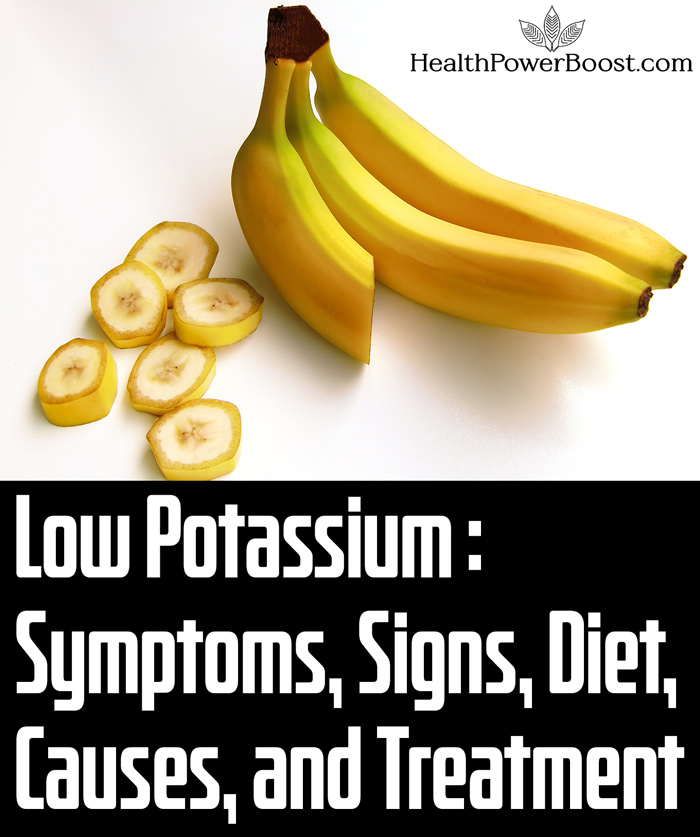This website is not medical advice. Posts may contain affiliate links from which I earn commissions at no additional cost to you.

Low Potassium – Symptoms, Signs, Diet, Causes, and Treatment Graphic © healthpowerboost.com. Background photo: Pixabay (PD)
Potassium is the third most abundant mineral element in the body. 98% of the potassium in the body is found in the cells. Of this, 20% is in the liver, bones, and red blood cells. The other 80% is found in the muscle cells. [1]

The mineral plays a role in sending nerve signals, regulating muscle contractions and helping the body regulate fluids. [2]
The body gets potassium partly through the foods we consume. And according to the National Institutes of Health (NIH), an adult requires 3.5 to 5.2 mmol/L of potassium. [3] This can be found in fruits and some legumes. However, many people adopt a western-style diet rather than a whole-plant food diet, which makes it hard for the body to meet its daily needs.
This, among other reasons, may lead to low potassium symptoms (aka. hypokalemia).
What Are The Symptoms Of Low Potassium?
It’s interesting to note that it can be hard to detect potassium deficiency in a blood test since most of it is inside the cell. So, when a blood test alone is done, this condition won’t show unless it’s extreme.

These symptoms may help you determine if you have low potassium levels:
1: Muscle weakness
This is the first symptom that can help you detect low potassium. [4] Potassium’s primary role is regulating muscle contraction so that these contractions may weaken when there’s a deficiency.
2: High blood pressure
Most people are aware that taking excess sodium can increase their blood pressure. [5] But the same can still happen if you have low potassium levels.
Potassium is responsible for regulating the sodium levels in the body. And when it’s low, the kidneys reabsorb the sodium back into the bloodstream leading to high blood pressure.
This is usually caused by low dietary potassium intake. [6]

3: Muscle cramps
Potassium plays a massive role in relaying signals from the brain hence stimulating skeletal muscle contraction. If the blood potassium levels are low, it may affect the balance causing prolonged and uncontrolled contractions, which contribute to muscle cramps.
Muscle cramps occur when there are severely low blood potassium levels (less than 23.5mmol/L). And in rare conditions, it can cause rhabdomyolysis, which involves the breakdown of muscle tissue that can lead to organ damage. [7]
4: Sugar cravings
Potassium plays a role in the production of insulin in the pancreas. And according to the National Institutes of Health Office of Dietary Supplements, low potassium levels negatively affect insulin secretion leading to glucose intolerance. [3]
Potassium helps in the storage of sugar. This helps eliminate sugar cravings: something the body can’t control if there is a deficiency.
5: Constipation
Since potassium helps stimulate contractions in the digestive system, it’s essential to have it balanced. [8] Otherwise, it can cause the contractions in the digestive system to weaken and slow the movement of foods causing constipation and bloating.
6: Abnormal heartbeat
Potassium helps maintain healthy heart muscle contraction. If it is low, it could lead to an irregular heartbeat, known as heart arrhythmia. [9]
Since it’s hard to detect low blood potassium levels, you may need to observe if you have either of these signs and symptoms. If you do, you can visit a professional doctor for either a blood test or an intracellular test.
What Are The Causes Of Low Potassium?
Several factors can cause low potassium. These include:
• Eating disorders; including laxative abuse, purging, and anorexia nervosa
• Kidney disorders such as Gitelman syndrome, Fanconi syndrome, and Bartter syndrome
• Hyperaldosteronism: a condition that is characterized by an excess of a steroid hormone called aldosterone in the body
• Some medications such as theophylline, beta 2-agonists, insulin diuretics, antimicrobials, and corticosteroids.
• Hypomagnesemia: low magnesium levels
• Chronic diarrhea: caused by infections, irritable bowel disease, or overdosing on laxatives or diuretics.
• Cushing’s syndrome
• Sugar
• Kidney failure
• Malnutrition
• Overconsumption of licorice
• Refeeding syndrome
• Excessive sweating
• Stress or high cortisol
In cases where a person has misused any medications or experiences excess fluid loss, it is crucial that they seek immediate medical attention.
How To Treat Low Potassium
Hypokalemia in mild and moderate cases can be treated using oral potassium supplements. [10]
Since some potassium-rich diets are usually paired with potassium phosphate instead of potassium chloride: hypokalemia may also involve a chloride deficiency; so treating both deficiencies may require taking supplements rich in potassium chloride. It’s essential you check with your healthcare provider to help you know the supplements you need.
A healthcare professional may be needed in severe cases of low potassium. They may do a test and recommend an intravenous (IV) treatment. It’s vital to ensure medical attention during the treatment: there is a high risk of rebounding high potassium, which can be fatal. [11]
Here are the reasons why you might need an intravenous treatment:
• Supplements by mouth aren’t working
• Low potassium is causing abnormal heart rhythms
• There are extremely low levels of potassium
• If the number of supplements taken by mouth is lower than the ones you’re losing
When taking diuretics, the doctor may review your test blood, suggest you take extra potassium supplements or adjust the diet or medication to help keep the potassium in the body.
What Diets Can Help Reduce The Risk Of Low Potassium?
Diets that include foods with potassium can help reduce the risk. Foods like lean meat, vegetables, fish, dairy, fruits, and legumes are foods you can eat. Here’s a full list of The Top 15 Potassium Rich Foods.
Conclusion: It is somewhat uncommon to develop serious potassium deficiency. It is even rarer for this condition to be caused by dietary lack alone. However, dietary factors and illnesses can put you at risk of the body not meeting the recommended daily intake. Adding foods rich in potassium and supplements can help you curb this.
=====================================================
References:
[1] Cheng, C. J., Kuo, E., & Huang, C. L. (2013, May). Extracellular potassium homeostasis: insights from hypokalemic periodic paralysis. In Seminars in nephrology (Vol. 33, No. 3, pp. 237-247). WB Saunders: https://www.ncbi.nlm.nih.gov/pmc/articles/PMC4131448/
[2] Sur, M., & Mohiuddin, S. S. (2022). Potassium. In StatPearls Publishing: https://www.ncbi.nlm.nih.gov/books/NBK539791/
[3] National Institutes of Health – Office of Dietary Supplements: https://ods.od.nih.gov/factsheets/Potassium-HealthProfessional/
[4] Kardalas, E., Paschou, S. A., Anagnostis, P., Muscogiuri, G., Siasos, G., & Vryonidou, A. (2018). Hypokalemia: a clinical update. Endocrine connections, 7(4), R135-R146: https://www.ncbi.nlm.nih.gov/pmc/articles/PMC5881435/
[5] Gonçalves, C., & Abreu, S. (2020). Sodium and potassium intake and cardiovascular disease in older people: A systematic review. Nutrients, 12(11), 3447: https://pubmed.ncbi.nlm.nih.gov/33182820/
[6] Stone, M. S., Martyn, L., & Weaver, C. M. (2016). Potassium intake, bioavailability, hypertension, and glucose control. Nutrients, 8(7), 444: https://www.ncbi.nlm.nih.gov/pmc/articles/PMC4963920/
[7] Jung, Y. L., & Kang, J. Y. (2017). Rhabdomyolysis following severe hypokalemia caused by familial hypokalemic periodic paralysis. World Journal of Clinical Cases, 5(2), 56: https://www.ncbi.nlm.nih.gov/pmc/articles/PMC5314262/
[8] Cosme, D., Estevinho, M. M., Rieder, F., & Magro, F. (2021). Potassium channels in intestinal epithelial cells and their pharmacological modulation: A systematic review. American Journal of Physiology-Cell Physiology, 320(4), C520-C546: https://pubmed.ncbi.nlm.nih.gov/33326312/
[1] Hoppe, L. K., Muhlack, D. C., Koenig, W., Carr, P. R., Brenner, H., & Schöttker, B. (2018). Association of abnormal serum potassium levels with arrhythmias and cardiovascular mortality: a systematic review and meta-analysis of observational studies. Cardiovascular drugs and therapy, 32(2), 197-212: https://pubmed.ncbi.nlm.nih.gov/29679302/
[10] Castro, D., & Sharma, S. (2021). Hypokalemia. In StatPearls Publishing: https://www.ncbi.nlm.nih.gov/books/NBK482465/
[11] Viera, A. J., & Wouk, N. (2015). Potassium disorders: hypokalemia and hyperkalemia. American family physician, 92(6), 487-495: https://pubmed.ncbi.nlm.nih.gov/26371733/
😳 What Tinnitus Does To Your Brain Cells (And How To Stop It)
After 47 years of studies and countless brain scans done on more than 2,400 tinnitus patients, scientists at the MIT Institute found that in a shocking 96% of cases, tinnitus was actually shrinking their brain cells.
As it turns out, tinnitus and brain health are strongly linked.
Even more interesting: The reason why top army officials are not deaf after decades of hearing machine guns, bombs going off and helicopter noises…
Is because they are using something called "the wire method", a simple protocol inspired by a classified surgery on deaf people from the 1950s...
★ Does Your Salad Contain This Vegetable?
★ Try This 100% Natural Essential Oil Mix For Nail Fungus:
★ I Can't Help Showing This Off:
If you haven't heard of Claude Davis yet do yourself a huge favor and watch this video.
One of the smartest guys I ever had the pleasure of meeting, Claude set-up a unique prepping system that changed his life forever.
I already tried it myself and let me tell... you I was completely blown away... His surprising tactics could make your life easier and give you the peace of mind you deserve.
Don't just take my word for it... watch his short video and decide for yourself.








